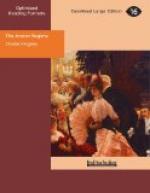And, be it always remembered, that in introducing these men into the “balance of the Constitution,” we introduce no unknown quantity. Statesmen ought to know them, if they know themselves; to judge what the working man would do by what they do themselves. He who imputes virtues to his own class imputes them also to the labouring class. He who imputes vices to the labouring class, imputes them to his own class. For both are not only of the same flesh and blood, but, what is infinitely more important, of the same spirit; of the same race; in innumerable cases, of the same ancestors. For centuries past the most able of these men have been working upwards into the middle class, and through it, often, to the highest dignities, and the highest family connections; and the whole nation knows how they have comported themselves therein. And, by a reverse process (of which the physiognomist and genealogist can give abundant proof), the weaker members of that class which was dominant during the Middle Age have been sinking downward, often to the rank of mere day-labourers, and carrying downward with them—sometimes in a very tragical and pathetic fashion—somewhat of the dignity and the refinement which they had learnt from their ancestors.
Thus has the English nation (and as far as I can see, the Scotch likewise) become more homogeneous than any nation of the Continent, if we except France since the extermination of the Frankish nobility. And for that very reason, as it seems to me, it is more fitted than any other European nation for the exercise of equal political rights; and not to be debarred of them by arguments drawn from countries which have been governed—as England has not been—by a caste.




